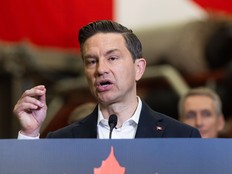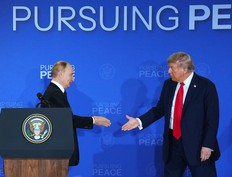How presidents can use pardon powers

Article content
In his last days in office, President Joe Biden is issuing expansive clemency orders.
Just this month, he’s pardoned his own son and commuted the sentences of nearly 1,500 people convicted of crimes in what the White House says is the “largest single-day grant of clemency in modern history.” He might not be done: Biden is getting pressure to pardon people on death row and is considering offering preemptive pardons for President-elect Donald Trump’s critics.
Recommended Videos
The ability to grant pardons is one of the president’s most absolute powers, and it often leads to controversy. Here’s what to know about it.
Granting pardons is the president’s constitutional right
The Constitution says presidents can “grant Reprieves and Pardons for Offenses against the United States, except in Cases of Impeachment.”
That means the president can forgive someone convicted of a federal crime, end their sentence and restore their rights – or a mix of any of those. The pardon power dates back to the British monarchy and the “godly” rights of kings, constitutional law expert Bernadette Meyler, author of the recent book “Theaters of Pardoning,” explained in a 2019 episode of the “Stanford Legal” podcast.
Pardons come in different forms
There’s commutations, which Biden granted to nearly 1,500 people Thursday. That’s a reprieve of someone’s sentence for a crime for which they were convicted – essentially a get-out-of-jail card. But commutations don’t wipe away convictions, as a full pardon does.
Presidents can also grant what’s called amnesty to a large group of people, as President Jimmy Carter did for Vietnam draft dodgers.
Presidents can even issue pardons before someone is charged with a crime, for any offenses they “may have committed.”
Biden’s pardon of his son Hunter Biden demonstrates how broad this power is. Hunter Biden’s convictions on gun and tax crimes went away with his father’s pardon, and he won’t face any sentencing. The president also wrote the pardon in such a way that his son should be protected from anyone digging into his past over a nearly 11-year time frame, a broad pardon without many historical matches.
A president’s pardon power is broad
No other branch of government has this power. “Presidents have absolute pardon power,” said Neama Rahmani, a former federal prosecutor.
The Supreme Court has said that presidential pardon power only covers federal crimes – not state ones – and that presidents can’t pardon someone who has been impeached by Congress.
“Other than that, there are no apparent limits on the power,” said Barbara McQuade, a former U.S. attorney now at the University of Michigan Law School.
But the Supreme Court has also said pardons shouldn’t infringe on other parts of the Constitution. “Nowhere in the Constitution does it state that the pardon power is some magical exception to any other enumerated powers,” said Grant Tudor, with the antiauthoritarian group Protect Democracy.
And a pardon can’t be undone.
It would take a constitutional amendment – one of the hardest things to accomplish in government – to undo or modify the pardon power.
Another check on pardon power is to impeach a president for abuses of it. But that’s never happened, even as some presidential pardons are criticized by members of their own party as being too egregious.
“Every president is pushing the boundaries of pardons,” said Saikrishna Prakash, a constitutional law professor at the University of Virginia.
Clemency is almost always controversial
Presidents usually grant clemency to hundreds of people at the end of every term. Most of them are people who have petitioned from jail to have their sentences commuted, who generally have a story of redemption, or who are low-level drug offenders whose sentences are too severe under current federal law.
The people whose sentences Biden commuted Thursday were on home confinement during the coronavirus pandemic and have “successfully reintegrated” with their families and communities, the White House said in a statement.
“America was built on the promise of possibility and second chances,” Biden said.
But it’s also not a coincidence that the bulk of grants of clemency happen on a president’s way out the door, because it’s common for a president to issue them political allies.
Biden pardoning his son will probably go down in the history books as one of the more controversial pardons. (Though some analysts argued that it was necessary to protect his son from prosecution from the next president.)
In his first term, Trump pardoned nearly half a dozen of his allies and friends for crimes such as lying to Congress and witness tampering, sometimes undercutting ongoing Justice Department investigations. “This is rotten to the core,” one Republican senator, Ben Sasse of Nebraska, said at the time.
“Never before had a president used his constitutional clemency powers to free or forgive so many people who could be useful to his future political efforts,” The Washington Post reported last year on Trump’s pardons.
One of those pardons was for Charles Kushner, the father of Trump’s son-in-law, Jared Kushner. The elder Kushner was convicted of tax evasion in what former New Jersey governor Chris Christie described as “one of the most loathsome, disgusting crimes that I prosecuted when I was U.S. attorney.” Trump just nominated Charles Kushner as U.S. ambassador to France.
Approaching his second term, Trump has talked about pardoning those convicted in the Jan. 6, 2021, attack on the U.S. Capitol.
Other historically fraught pardons came when President George H.W. Bush pardoned a former secretary of defense for illegally selling arms to Iran. President Bill Clinton pardoned a top donor.
Presidents might be able to pardon themselves, say legal experts. But no one has tried it, so the courts have yet to weigh in. Trump will enter office with a conviction for business fraud that was prosecuted in New York as a state crime, where his pardon power can’t reach. All of the federal prosecutions aimed at Trump have been dropped since he won the Nov. 5 election.
Probably the most famous pardon was for a former president: In 1974, President Gerald Ford pardoned his predecessor, Richard M. Nixon, for any crimes he may have committed related to the Watergate break-in.
Some criminal justice advocates say that there are ways to modify the pardon power to make it more fair.
The Brennan Center for Justice wants the government to create independent, bipartisan boards to make recommendations to the president and review them. “That could reduce the public perception that pardons arise out of political favor,” said Lauren-Brooke Eisen, senior director for the Brennan Center’s justice program.
But that would require presidents to willingly give up one of their most expansive powers in the Constitution.
“It seems that every presidential administration would want to keep the power as unlimited as possible,” said McQuade, the former U.S. attorney.











Postmedia is committed to maintaining a lively but civil forum for discussion. Please keep comments relevant and respectful. Comments may take up to an hour to appear on the site. You will receive an email if there is a reply to your comment, an update to a thread you follow or if a user you follow comments. Visit our Community Guidelines for more information.